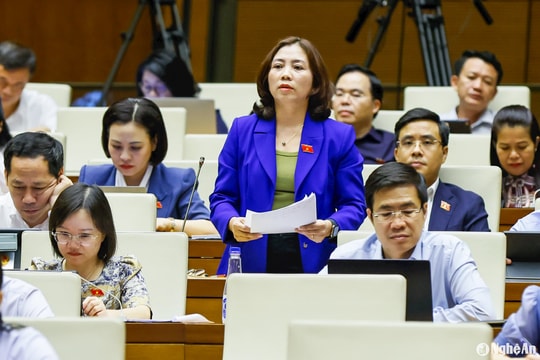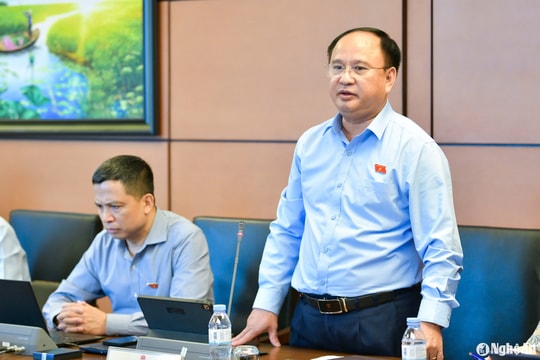Part 2: Listening effectively, acting effectively
How can elected representatives truly listen, understand and promptly reflect the opinions and aspirations of voters? From thematic voter contact conferences to the two-level contact model, the delegation of National Assembly and People's Councils at all levels of Nghe An province has been pioneering in innovating the way of contacting voters, creating closeness, efficiency and building strong trust between representatives and the people.
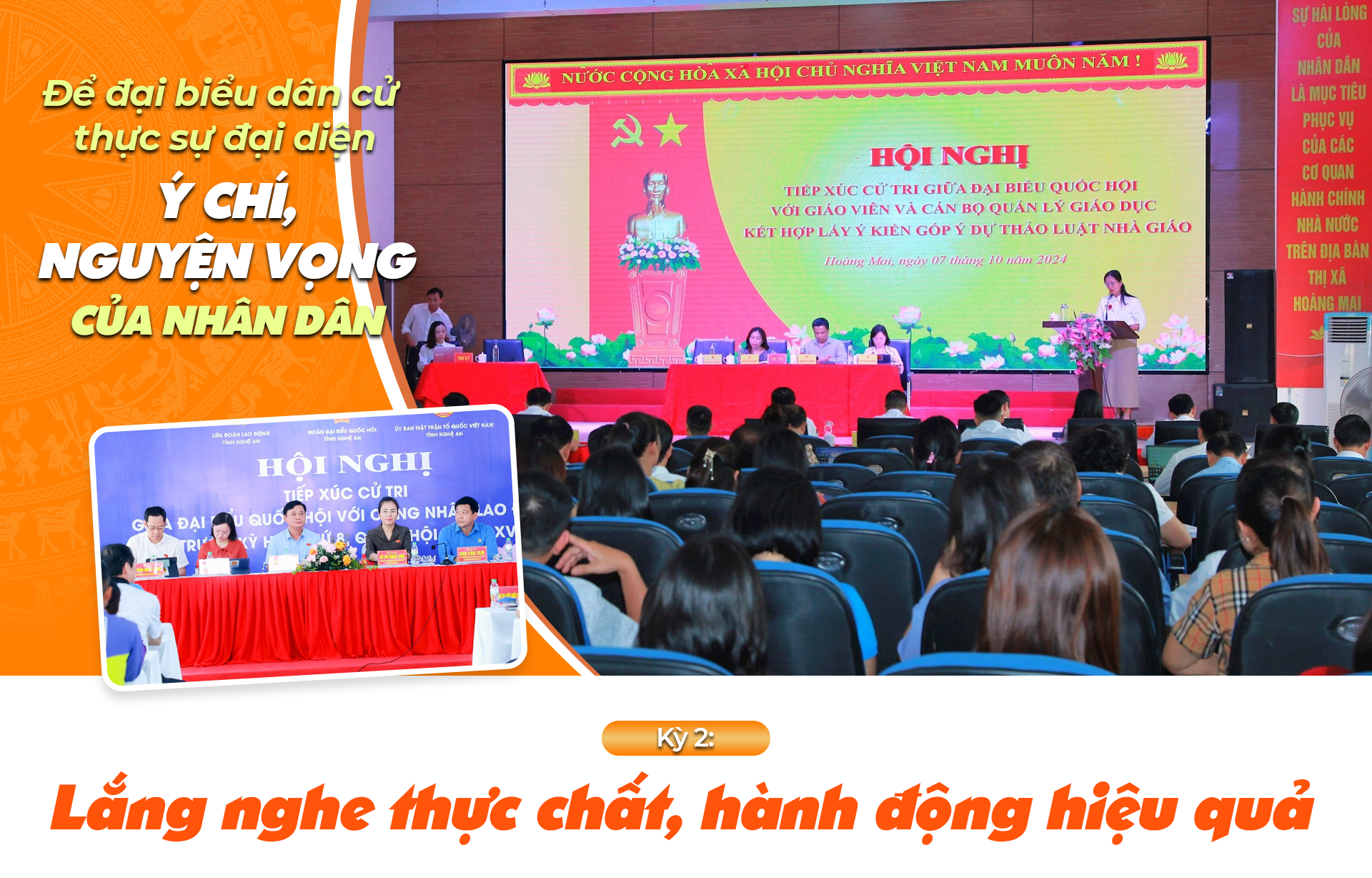
News and Political Reporters Group• November 19, 2024
How can elected representatives truly listen, understand and promptly reflect the opinions and aspirations of voters? From thematic voter contact conferences to the two-level contact model, the delegation of National Assembly and People's Councils at all levels of Nghe An province has been pioneering in innovating the way of contacting voters, creating closeness, efficiency and building strong trust between representatives and the people.

On the afternoon of October 11, 2024, at the Conference Hall of Sangwoo Vietnam Co., Ltd., VSIP Nghe An Industrial Park, Mr. Thai Thanh Quy - Member of the Party Central Committee, Deputy Head of the Central Economic Committee (at that time was Secretary of Nghe An Provincial Party Committee), Head of the National Assembly Delegation of Nghe An province and other members of the National Assembly Delegation of Nghe An province met with 200 voters who are workers representing nearly 100,000 union members who are workers in the whole province. The conference was attended by Vice President of the Vietnam General Confederation of Labor Phan Van Anh.
Voters were excited to talk to elected representatives for the first time and reflect on many macro-level issues regarding housing policies, wages, and insurance for workers.
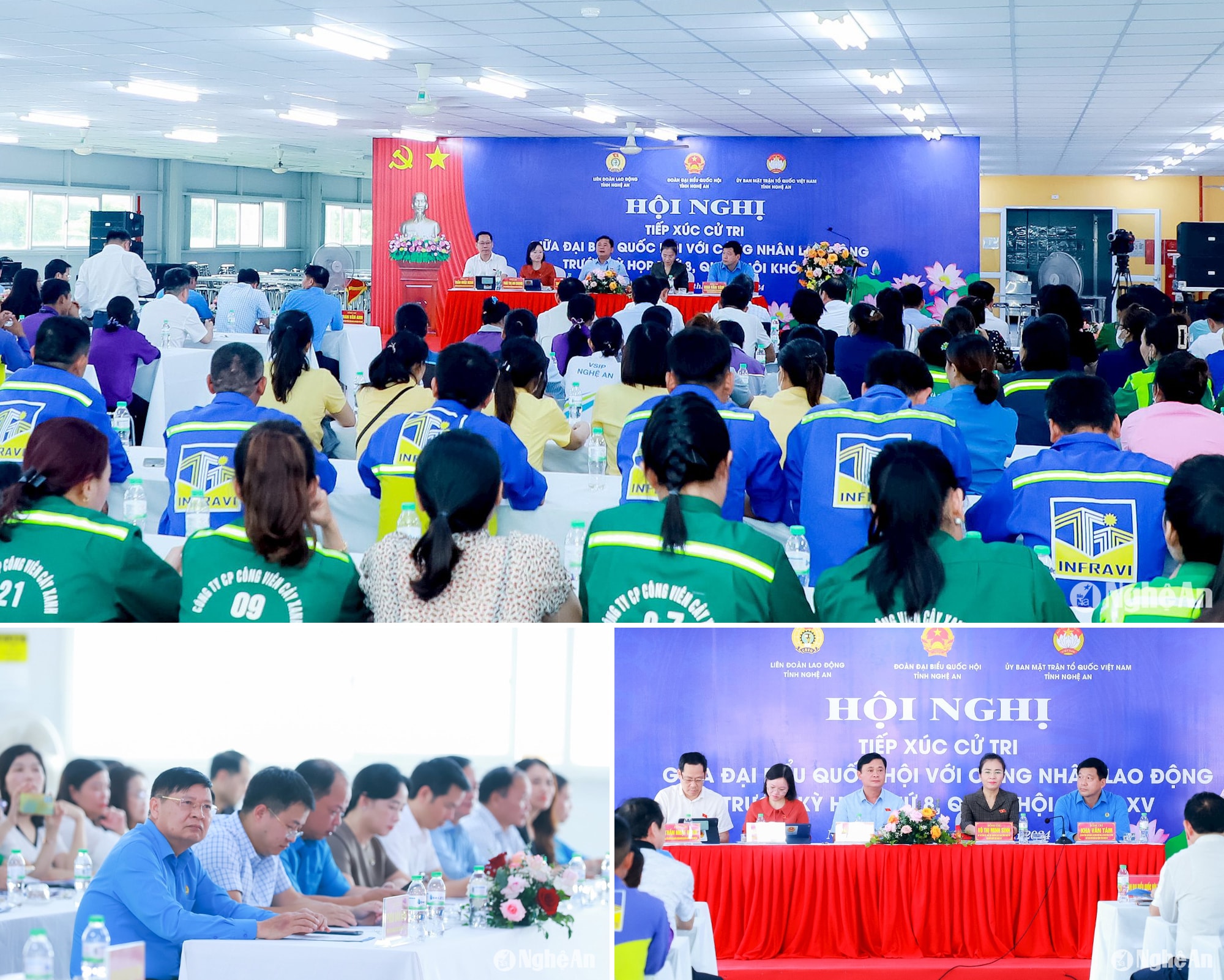
Mr. Vuong Dinh Tuan, a worker at Lushare -ICT Company, shared the desire and wish of most workers to have a stable house to work with peace of mind. "Currently, many workers have to rent a house, their children have to be sent back to their hometowns," Mr. Tuan said, and asked National Assembly delegates to consider reducing the lending interest rate below the current 6.5% for the Government's 120 trillion VND social housing credit package to facilitate access. In addition, he and many other workers also said that information on social housing projects, purchase and rental procedures to workers is very limited, so they suggested that information and propaganda about social housing should be provided to workers.
Sharing the concerns in life with workers, especially the issue of housing, the Head of the National Assembly Delegation of Nghe An province affirmed: The province has "seen through" this problem and will continue to focus more attention and direction on attracting investment in social housing projects; at the same time, receiving feedback from workers to the Government that the interest rate of the 120,000 billion VND package for social housing loans is still high.
.jpg)
Immediately after the meeting with voters, to better understand the living conditions of workers, the Head of the National Assembly Delegation of Nghe An province and the Vice President of the Vietnam General Confederation of Labor went directly to the workers' boarding house in Nghi Kim commune, Vinh city to visit, encourage, and listen to more opinions of voters who are workers.
Through this meeting with voters, the Head of the National Assembly Delegation of Nghe An province thanked the workers and laborers who participated and gave many enthusiastic opinions. Following the success of this conference, the National Assembly Delegation of the province will continue to hold many similar conferences to listen to more multi-dimensional and comprehensive aspirations; understand more about work and life; and grasp more of the aspirations and wishes of voters who are workers.
Evaluating the first-ever specialized conference to contact voters with workers, Mr. Kha Van Tam - Chairman of Nghe An Labor Federation shared: "Today's conference to contact voters is also an opportunity for National Assembly deputies to grasp more of the thoughts and aspirations of workers, to have a basis to synthesize and reflect to the National Assembly, relevant agencies and organizations to research, build, amend, supplement and perfect policies and laws for workers to ensure feasibility and close to reality in order to care for and protect the legitimate and legal rights and interests of union members and workers, build harmonious, stable and progressive labor relations in enterprises, contribute to promoting socio-economic development and effectively implement social security activities".
“Compared to other forms of voter contact, thematic voter contact is not only welcomed by voters but also helps delegates understand many practical issues, so that they can contribute their opinions on the National Assembly forum. This helps delegates record many in-depth opinions on macro mechanisms and policies, and specific issues that delegates are interested in. On the other hand, this is also a condition for voters to express their opinions to competent agencies to resolve their recommendations, thoughts, and aspirations in specialized fields. Through this method, many voters with in-depth expertise have been invited to contribute their opinions,” Ms. Hoang Thi Thu Hien - Permanent Vice President of the Women's Union of Nghe An province, National Assembly Delegate of Nghe An shared and added: “Thematic voter contact is also flexibly integrated by the National Assembly Delegation of the province into thematic supervisions, collecting opinions on law making, in working sessions with the Provincial People's Committee and departments and branches”.
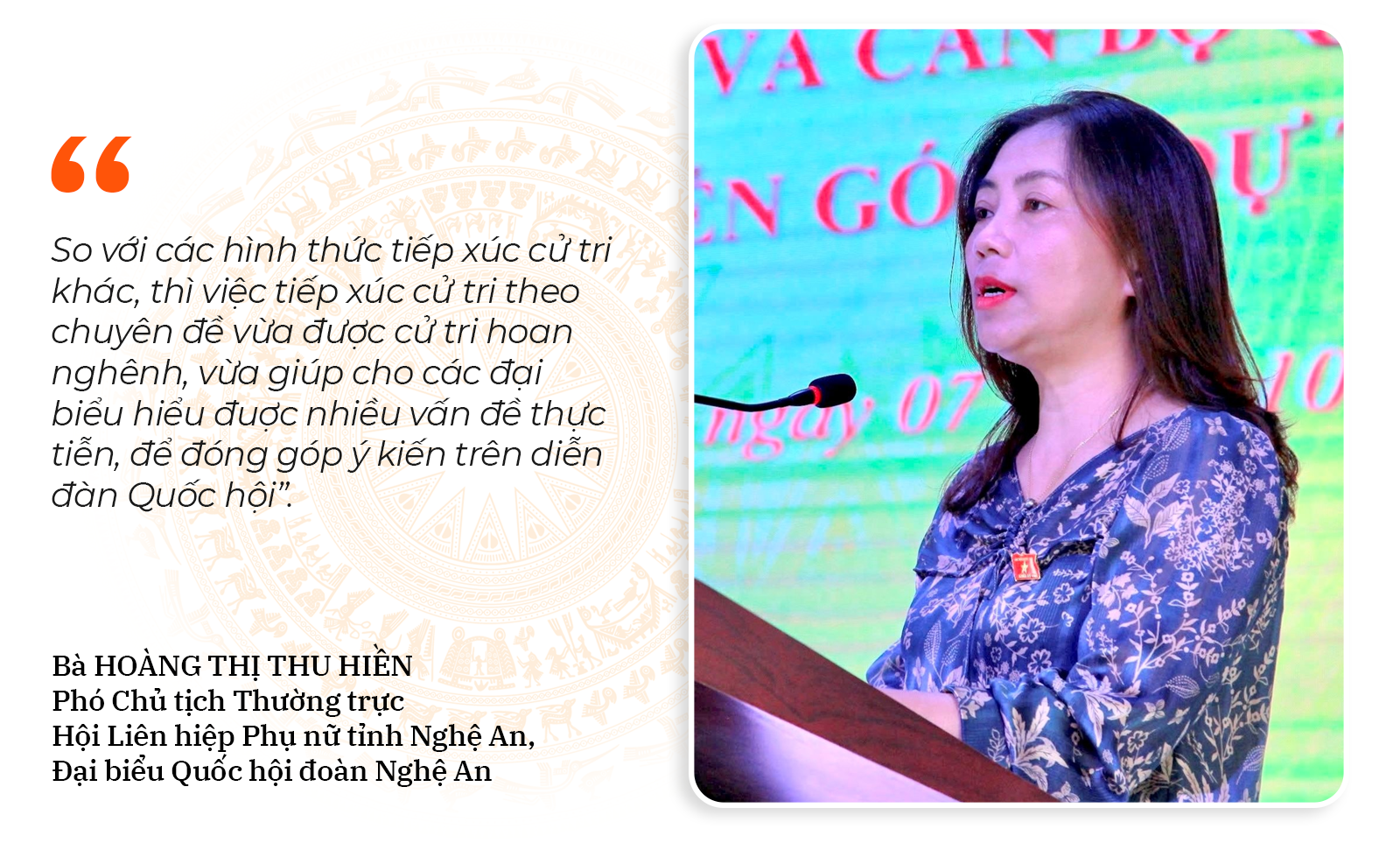
Contacting voters by subject has many similarities with the form of contacting voters by topic. The National Assembly delegation of Nghe An province has flexibly selected specific groups of subjects to listen closely to the thoughts, aspirations and opinions related to each field. The groups of voters include: cadres, civil servants, armed forces; women's union members; education and health sector staff; youth union members; ethnic minorities; residents of areas affected by hydropower and irrigation projects; fishermen in coastal areas. In particular, the delegation also organized meetings outside the province, such as in Dak Lak, where many Nghe An people have gone to build new economies, to grasp the situation and listen to the voices of their compatriots far from home.
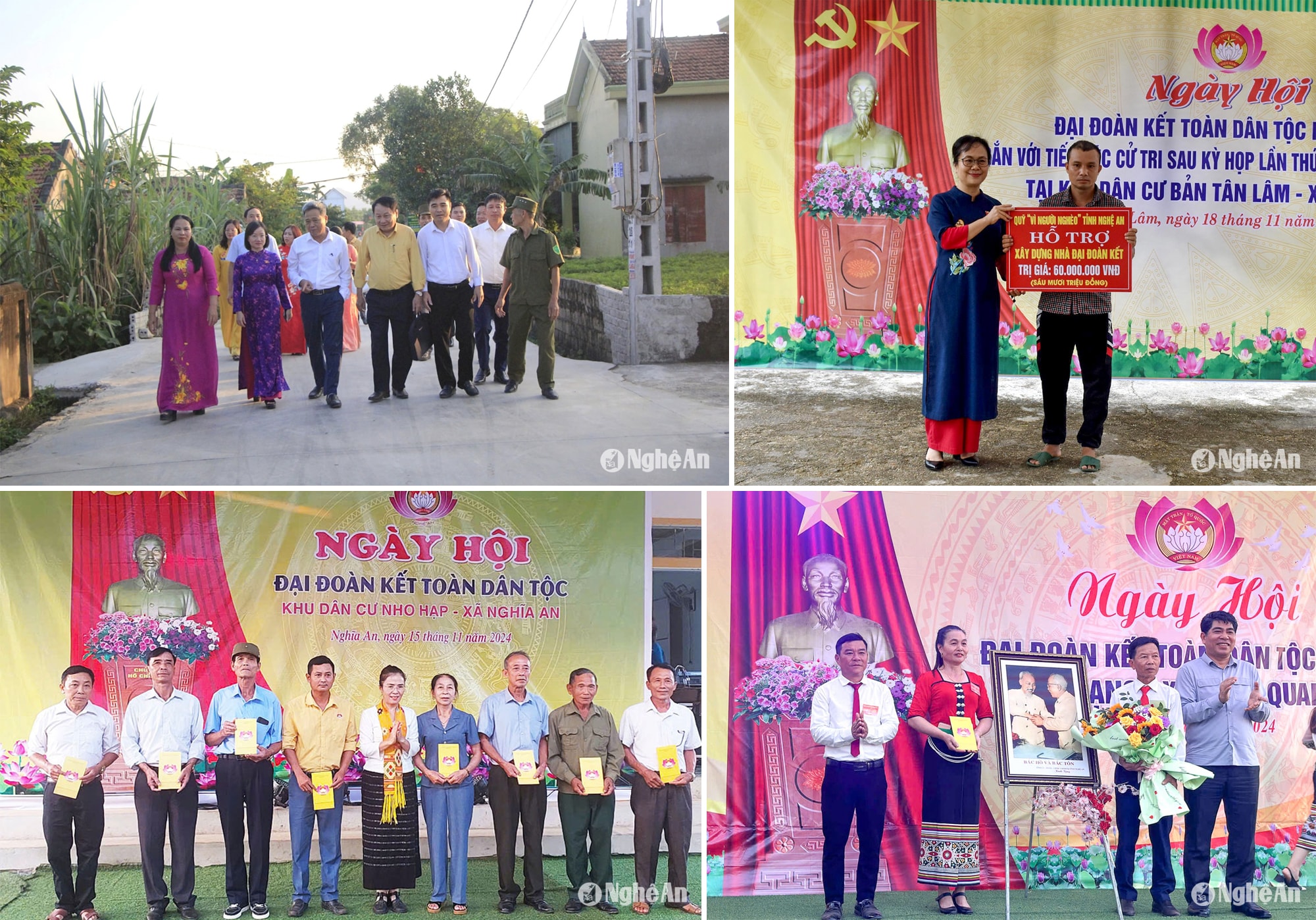
In addition, the Provincial National Assembly Delegation also organized a number of meetings with voters who are party members through the combination of attending Party cell meetings. In particular, the Provincial National Assembly Delegation and the Standing Committee of the Provincial Fatherland Front Committee organized National Assembly deputies to meet voters in combination with attending the National Great Unity Day in residential areas. This is a very meaningful form of voter meetings, an opportunity for deputies to share the joy of great unity with voters, thereby further strengthening the connection between elected representatives and voters.
Since the beginning of the term, the National Assembly Delegation of Nghe An province has organized 9 thematic meetings with voters, including: Socio-economic development planning, associated with land use planning and site clearance compensation; regulations of the draft Land Law (amended) related to land for ethnic minorities and agricultural and forestry land; draft Law on Cooperatives (amended); social insurance; thematic meetings with voters who are workers, laborers, officials, members, women; officials, civil servants, public employees...
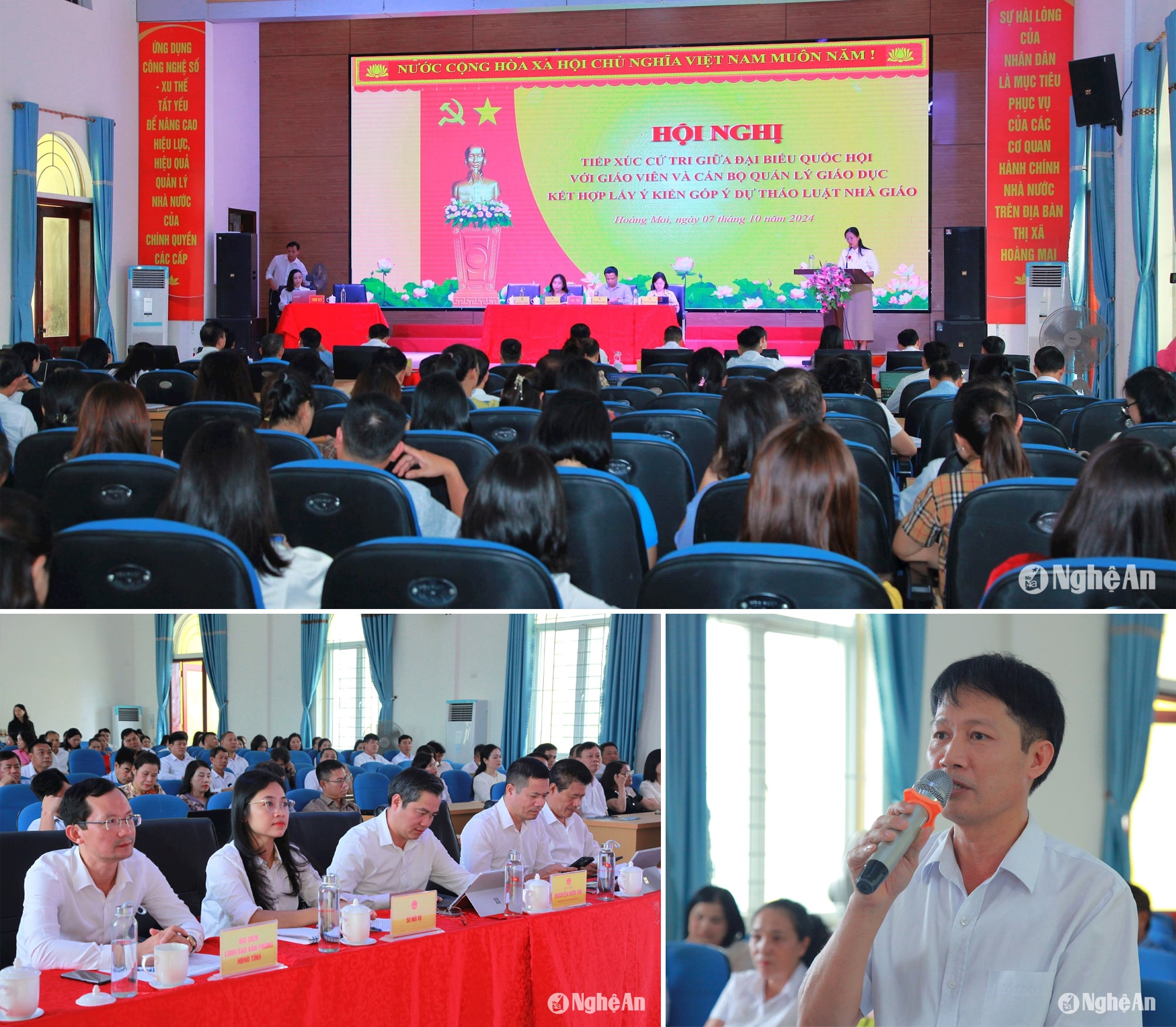

Not only the provincial National Assembly deputies' contact with voters, but the People's Council deputies at all levels in Nghe An also pay great attention to innovating the forms of organizing voter contact through flexible forms, especially integrating voter contact at two levels, including: National Assembly deputies and provincial People's Council deputies; provincial and district People's Council deputies; district and commune People's Council deputies.
Mr. Chu Duc Thai - Head of the Culture - Society Committee, Nghe An Provincial People's Council said: "I am a provincial People's Council delegate elected in Dien Chau district, having met with voters at two levels along with district People's Council delegates, I see that it has created convenience for the grassroots in arranging and allocating appropriate time and location, reducing inconvenience for the grassroots. Besides, it also helps to classify voters' opinions to transfer to more appropriate competent authorities, which opinions are under the jurisdiction of the Central, the province, and the district to be clearer. Meeting with voters at many levels is also a channel for voters to monitor and evaluate the effectiveness and responsibility of the delegates at all levels they elected."
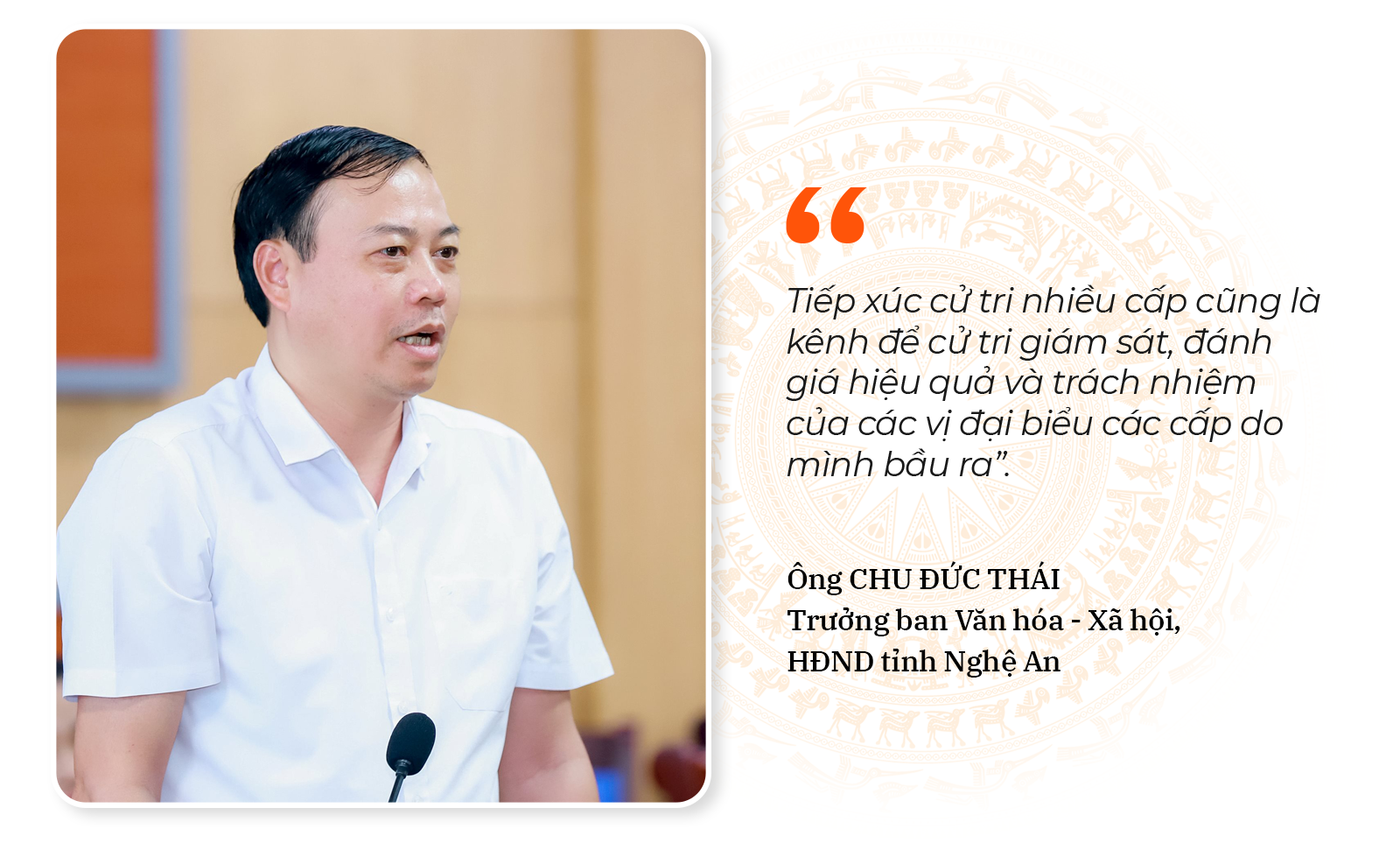
With a mountainous border area like Que Phong district, the terrain is mainly mountainous, transportation is still difficult, awareness and education of voters are not uniform, Mr. Luu Van Hung - Vice Chairman of the People's Council of Que Phong district, Nghe An assessed: "Organizing multi-level voter meetings has created favorable conditions for localities not to have to organize many voter meetings and for voters not to have to travel many times. Because in reality at the grassroots level, voters have not yet distinguished which content is under the authority of which level to make recommendations, so one opinion content is recommended many times at many levels; at the same time, voters also grasp more information, both of the country and the province, or of the province and district, district and commune".
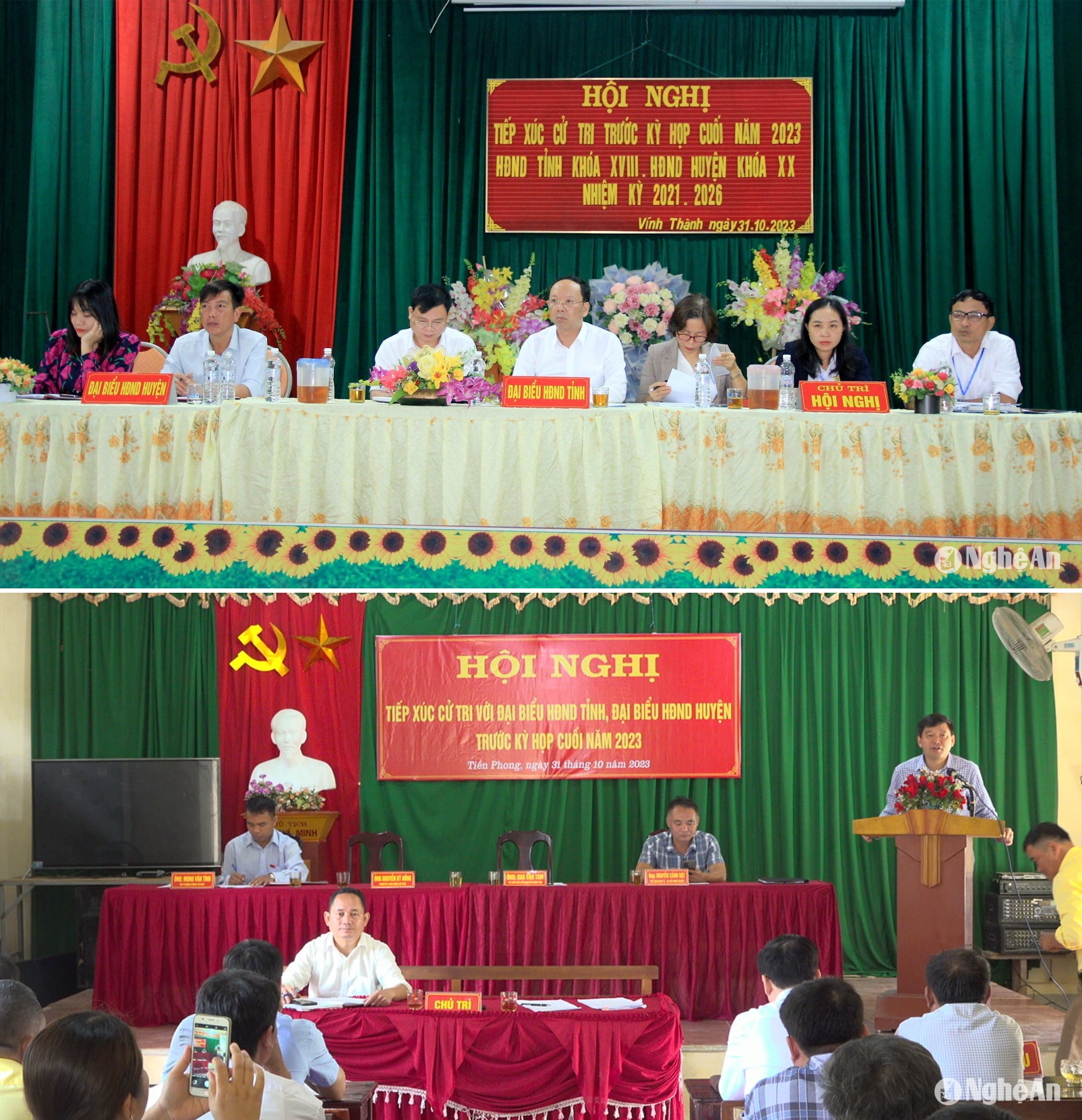
In practice, two-level voter contact is a truly effective form of contact. Through voter contact, elected representatives maintain contact with voters, contributing to promoting the relationship between representatives and voters; at the same time, helping representatives listen, record and resolve people's concerns and suggestions more effectively. In addition, through voter contact sessions, especially sideline meetings, representatives better understand the lives of the people in the places where they run for election, thereby gaining sympathy for voters' thoughts and aspirations.
Ms. Nguyen Thi Luong, a voter from Vinh city, said: “Participating in meetings with voters of both the provincial and city People's Council delegates; besides reflecting the thoughts and aspirations to both the provincial and city levels, I also get to hear and grasp more information from the province and the city, thus having a more comprehensive and overall view of the implementation of policies and guidelines. In addition, many of the voters' recommendations beyond the city's authority are also acknowledged and answered by provincial delegates; thus, the effectiveness of meetings with voters is higher and of better quality.”

The innovations in the form of contact with voters of the National Assembly Delegation and People's Councils at all levels in Nghe An are not only solutions to enhance the substance and effectiveness of supervision activities but also a strong connection between elected representatives and the People. From thematic conferences to listen deeply to the opinions of each group of voters to the flexible form of two-level contact, the delegates not only acknowledge but also promote the resolution of urgent recommendations of voters in a practical and realistic manner.
Substantive listening and effective action have contributed to enhancing the people's trust in elected representatives, promoting policies that are increasingly close to the needs of life. The meetings do not stop at listening but also open up opportunities for dialogue, empathy and together finding solutions, building the future. This is a clear demonstration of the sense of responsibility of elected representatives, affirming the role of a bridge between the people and legislative bodies and the government.
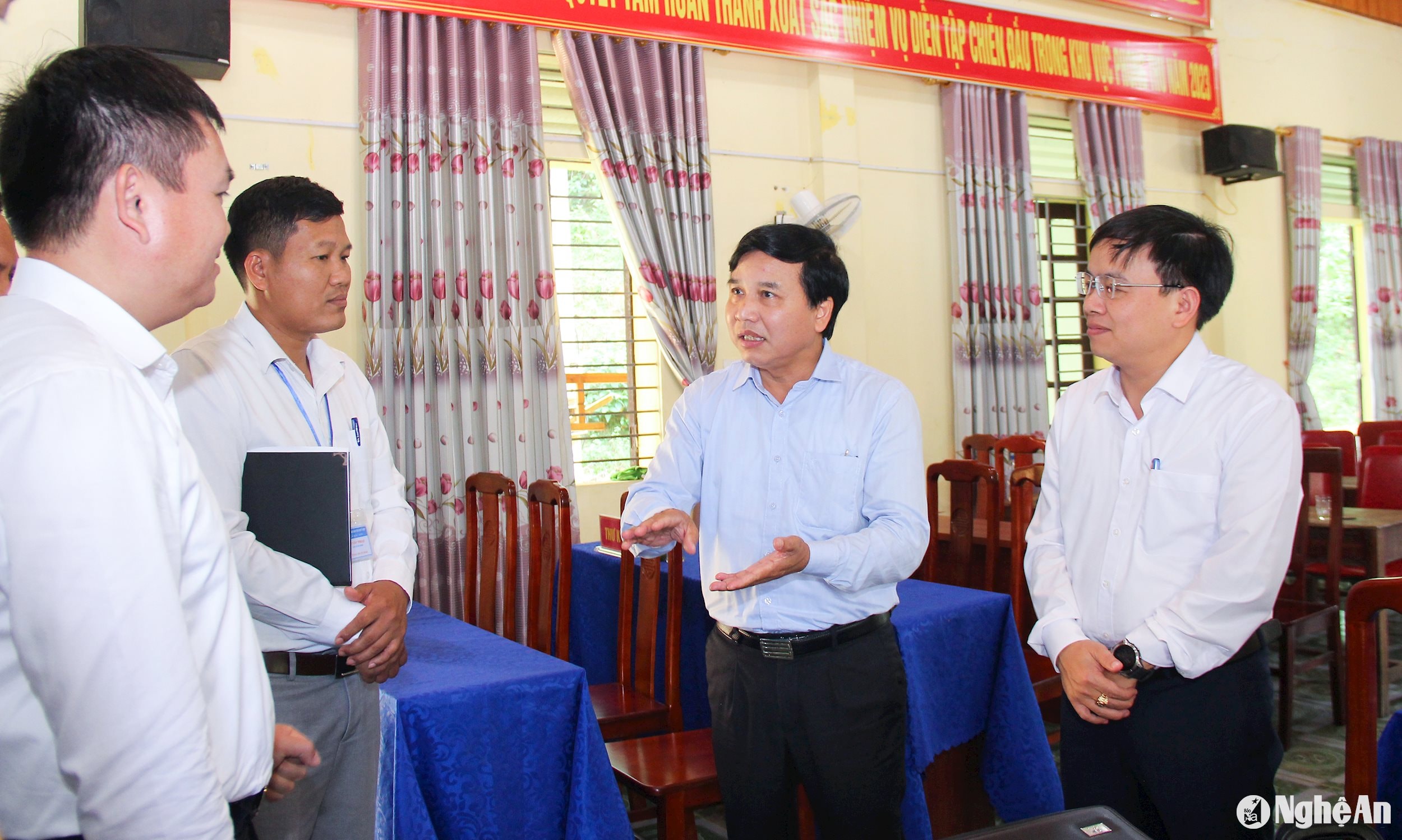
That innovation journey has been affirming Nghe An as one of the pioneering localities in building a close relationship between delegates and voters, creating a driving force to promote socio-economic development and ensure the rights and happiness of the people. A strong belief has been planted, spread and become the driving force for delegates to continue to contribute and accompany voters on the path of national development.


